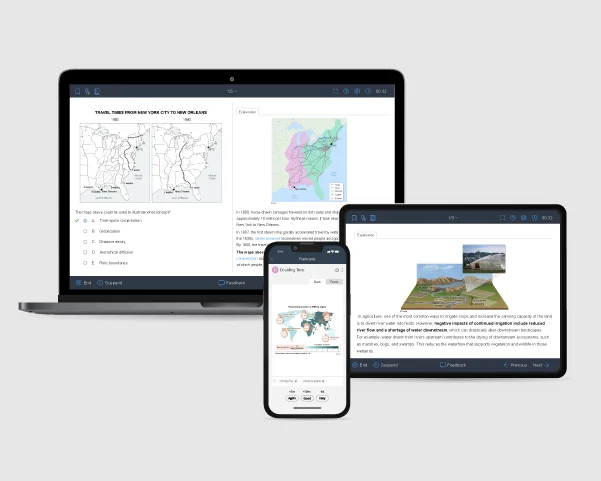The AP Human Geography exam is a 2-hour and 15-minute examination that can influence college admissions and even get you college credit and placement. If you are enrolled in the AP HUG course or are self-studying for the exam, it is important to understand how the test is scored. This is probably one of the first steps to help you prepare for the exam effectively, and it can help you plan your study strategy. Familiarizing yourself with the AP Human Geography grading scale will also allow you to concentrate on exam sections where you are likely to perform well.
How Is the AP Human Geography Exam Scored?
The AP Human Geography exam consists of 2 types of questions: multiple-choice questions (MCQs) and free-response questions (FRQs). Section I consists of 60 MCQs that must be answered in 1 hour, and section II consists of 3 FRQs that must be completed in 1 hour and 15 minutes. Each section is worth 50% of the total exam score. Here's an overview of the sections, the number of questions and their types, and the raw scores for each section:
| Section | Questions | Time Allocated | Point per Question | Raw Score |
|---|---|---|---|---|
| Section I | 60 MCQs | 1 hr | 1 | 60 |
| Section II | 3 FRQs | 1 hr 15 mins | 7 | 60 |
| Total Composite Score | 120 | |||
For each correct answer in the multiple-choice section, students can earn 1 point. Therefore, it is possible to earn a maximum of 60 points by answering each of the 60 questions correctly. Remember that 50% of your final grade will be determined by your performance in this section. Your performance on the FRQs, which are graded on a 7-point rubric, count for 50% of your final grade.
After the raw scores for both sections I and II are calculated, they are converted to derive your composite score out of 120. This composite score is again converted per the College Board’s AP scale of 1 to 5.
AP Human Geography Scoring Table
Your AP Human Geography score is used by colleges to determine who receives course credit and/or placement. Students must achieve a minimum score of 3 to be eligible for college credit.
The College Board conducts extensive research to set the AP exam scores so that they can represent how well students would do in a real college class. In AP Human Geography, the main goal is to teach a college-level geography class in high school. So, the board makes sure that if you get a certain score on the AP HUG exam, it means you would do comparably well in a similar college-level geography course. The table below shows the equivalency of AP scores with regular college grades for human geography.
| AP Exam Score | College Grade Equivalent | Qualification |
|---|---|---|
| 5 | A+ or A | Extremely well qualified |
| 4 | A-, B+, or B | Well qualified |
| 3 | B-, C+, or C | Qualified |
| 2 | — | Possibly Qualified |
| 1 | — | No recommendation |
On the AP HUG examination, a score of 4 or 5 is regarded as outstanding. Always verify the minimum requirements of the colleges you intend to apply to.
AP Human Geography is a popular introductory course. While students often find the content "easy," they consider the exam "hard," leading to low AP test scores.

AP Human Geography Score Distribution
If you’re preparing for the AP HUG exam, it is important to learn how other students have performed in the last few years. This allows you to gauge the difficulty level of the exam and can help you evaluate whether this course could fit into your AP schedule comfortably. Check out the table below to learn about the AP Human Geography score distribution from the past 3 years:
| AP Score | % of Students 2025 | % of Students 2024 | % of Students 2023 |
|---|---|---|---|
| 5 | 17.0% | 17.9% | 16% |
| 4 | 25.2% | 20.5% | 20% |
| 3 | 22.5% | 17.8% | 18% |
| 2 | 25.4% | 14.3% | 14% |
| 1 | 9.9% | 29.5% | 32% |
Most colleges require a 3 or higher for college credit. AP Human Geography can be used with the right study tools, course instruction, and dedication.
As per the AP Human Geography score distribution, the percentage of students scoring 3 or higher continued to trend upward, rising from 54.4 % in 2023 to 56.1 % in 2024, and reaching 64.7 % in 2025, showing sustained gains in student performance.
Minimum Score Requirement for College Credit
With a score of 3 or higher on the AP Human Geography exam, you can earn up to three hours of college credit. Some schools, however, require a 4 or 5 for college credit. Some colleges offer both advanced placement and credit, which allows you to skip the course and receive credit for it. AP credit policies vary with colleges. It’s a good idea to check with your prospective college on the credit and placement policies for AP HUG.
Prepare effectively for top scores with our AP HUG prep course, study guide, and QBank which breaks down challenging AP Human Geography concepts and provides comprehensive content and practice tests to help you improve your performance.
Frequently Asked Questions (FAQ)
What is a good AP Human Geography score?
What is the average AP Human Geography score?
Why are AP Human Geography scores curved?
When are AP Human Geography scores released?
How do you get a 5 in AP Human Geography?
It is important to practice exam-like multiple-choice questions and get to know the free-response question rubric. To boost your confidence, increase your knowledge, and prepare for the AP Human Geography exam, follow these 5 steps:
- Take an AP Human Geography practice test to find out how much you know.
- Make a plan to study (and stick to it) before your test.
- Use an online learning tool that has practice questions like those on the test and full explanations.
- Keep track of your progress to see where you’re doing well and where you need to improve.
- Start studying for an exam by practicing. This allows you to see how your answers compare to others that have already been graded.

References
- Past AP Human Geography Score Distributions. (n.d.). apstudents.collegeboard.org. Retrieved from https://apstudents.collegeboard.org/about-ap-scores/score-distributions/ap-human-geography
Read More About AP Human Geography
AP Human Geography Exam Format
Knowing the format of the exam is a tremendous advantage. This guide explains the AP Human Geography exam format, including exam components, question types, and more.
AP Human Geography Course and Exam Description
Are you curious about the units, topics, and concepts tested on the AP Human Geography Exam? Our AP HUG Course and Exam Description Summary has everything you need.
AP Human Geography Study Plan & Tips
Exam success requires access to an informative study guide and materials. To ace your AP HUG exam, make the most of UWorld's essential review tips on frequently tested topics.
Best AP Human Geo Study Guide Comparison
Kaplan vs. Barron's vs. Princeton Review vs. UWorld—compare strategies, features, and effectiveness to find the ultimate guide for AP Human Geo success.
Best AP Human Geo Prep Course Review
Discover the best AP HUG prep courses available. Compare key features, pricings, reviews, and benefits to select the course that best fits your learning.
How to Self-Study for AP Human Geo
Want to ace AP Human Geo on your own? Follow this expert self-study guide with tips, tricks, and tools to prepare effectively for the exam.




